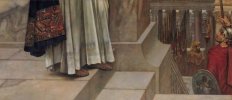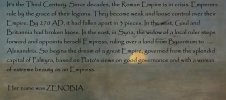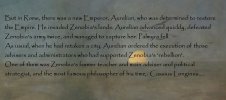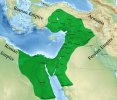-
Sign up or login, and you'll have full access to opportunities of forum.
You are using an out of date browser. It may not display this or other websites correctly.
You should upgrade or use an alternative browser.
You should upgrade or use an alternative browser.
The Philosophers
- Thread starter Loxuru
- Start date

Loinclothslave
slave to the whip
He probably brought it forward to stop us pythonising the New Threads thread…Is it finally starting?!
M
montycrusto
Guest
So far he’s only given us a socrateaser..He probably brought it forward to stop us pythonising the New Threads thread…

Migoz2
Senator
There is a whole section of Aristotle's Poetics devoted to @montycrusto's humour. It's a shame it has been lost.................So far he’s only given us a socrateaser..
Loinclothslave
slave to the whip
A lovely little thinker but a bugger when he’s pissed?So far he’s only given us a socrateaser..
Migoz2
Senator
Good with his headA lovely little thinker but a bugger when he’s pissed?
Loinclothslave
slave to the whip
Palmyra? First time I’ve seen a Syrian setting here, iirc… so far living up to the hype of the marketing campaign!
Loxuru
Graf von Kreuzigung
I.
Palmyra, Syria, 272 AD. The late evening.
‘Splash!’
A spray of cool water in my face and over my body.
It feels refreshing. During a moment I live up.
Then my true situation takes over : I take a deep, howling breath. Painful cramps all over my body, in my back, my arms and legs. The previously numb pain in my wrists and ankles is revived! I curse and whine! I am still alive!
Did I pass out, or had I even fallen asleep?
I hear more pouring of water
Around me, I hear growling and moaning.
It is dark! Roman legionnaires march around, with torches. More, fixed, torches light the place!
The optio, commanding the guards is greeted by another one.
“Apparently, they are all still alive!”
“Yes, it looks like they are! These old men can endure surprisingly for long on a cross!”
“Nothing special to report? Signs of riot!?”
“Nothing special!” the first optio says to the second one “So, I leave them to you, Severius! Goodnight”
“Goodnight!”
The relieved guards march away.
“Remember! Keep them alive as long as possible! Orders from the emperor himself!” the new optio shouts to his men.
“At your orders, optio!”
“Now that they all are conscient again, give them wine to drink!”
“At your orders, optio! But what if they refuse, Sir!?”
“They will not refuse! Their survival instincts are too strong!”
“Yes, Sir!”
A few legionnaires carrying an amphora with wine, a sponge and a pilum. One of them, still a young soldier stops in front of me. He raises the wine soaked sponge on the tip of the pilum, and brings it to my mouth.
“Here, old man, drink!”
It has no use to reply about that ‘old man’ to a young kid of hardly twenty! Neither do I refuse the drink. I suck it from the sponge, letting drip a lot over my chin and on my chest, my belly and further downwards. The word ‘traitor’ figures in three languages (Latin, Greek and Aramian) above my head, and it is pointless to continue to resist. After all, the soldier standing in front of my cross, and whose father, or even grandfather I could have been, is just carrying out orders, and perhaps, if I behave, he could give me a welcome second portion. That optio was right : survival instincts are hard to defeat, even in the agony of being crucified for death.
The soldier takes down the sponge. I lick what I can from around my mouth. Then the legionnaire asks : “Want some more, old man!?”
I gratefully accept his offer.
(To be continued)
Palmyra, Syria, 272 AD. The late evening.
‘Splash!’
A spray of cool water in my face and over my body.
It feels refreshing. During a moment I live up.
Then my true situation takes over : I take a deep, howling breath. Painful cramps all over my body, in my back, my arms and legs. The previously numb pain in my wrists and ankles is revived! I curse and whine! I am still alive!
Did I pass out, or had I even fallen asleep?
I hear more pouring of water
Around me, I hear growling and moaning.
It is dark! Roman legionnaires march around, with torches. More, fixed, torches light the place!
The optio, commanding the guards is greeted by another one.
“Apparently, they are all still alive!”
“Yes, it looks like they are! These old men can endure surprisingly for long on a cross!”
“Nothing special to report? Signs of riot!?”
“Nothing special!” the first optio says to the second one “So, I leave them to you, Severius! Goodnight”
“Goodnight!”
The relieved guards march away.
“Remember! Keep them alive as long as possible! Orders from the emperor himself!” the new optio shouts to his men.
“At your orders, optio!”
“Now that they all are conscient again, give them wine to drink!”
“At your orders, optio! But what if they refuse, Sir!?”
“They will not refuse! Their survival instincts are too strong!”
“Yes, Sir!”
A few legionnaires carrying an amphora with wine, a sponge and a pilum. One of them, still a young soldier stops in front of me. He raises the wine soaked sponge on the tip of the pilum, and brings it to my mouth.
“Here, old man, drink!”
It has no use to reply about that ‘old man’ to a young kid of hardly twenty! Neither do I refuse the drink. I suck it from the sponge, letting drip a lot over my chin and on my chest, my belly and further downwards. The word ‘traitor’ figures in three languages (Latin, Greek and Aramian) above my head, and it is pointless to continue to resist. After all, the soldier standing in front of my cross, and whose father, or even grandfather I could have been, is just carrying out orders, and perhaps, if I behave, he could give me a welcome second portion. That optio was right : survival instincts are hard to defeat, even in the agony of being crucified for death.
The soldier takes down the sponge. I lick what I can from around my mouth. Then the legionnaire asks : “Want some more, old man!?”
I gratefully accept his offer.
(To be continued)
Loxuru
Graf von Kreuzigung
II.
The optio and two of his men stroll along the crosses. The flickering light of either the torches they carry, and of the fixed ones all over the site, illuminate the naked bodies of the crucified. The optio orders that it is time soon to ‘water’ the condemned again and to give them to drink. One of the legionnaires, the one who gave me to drink, then asks a question:
“Sir, with permission?”
“Yes, soldier!?”
“That man there, ” he asks, as he points to a cross, “his titulus says Cassius Longinus! Is that the famous philosopher from Athens?”
“It is right him, soldier! The famous philosopher and scholar Cassius Longinus from Athens! A sad end for such a famous man, but he deserves his verdict! They all do, here! Traitors of Rome, rebels, war criminals as they are! Keep this in mind, soldier : even fame and scholarship are no guarantee for virtue and loyalty! All these philosophers, as they call themselves, have betrayed their fatherland Rome, despite they all owed everything they had, to the generosity of Roman society and its culture! Remember, it is always better to be a good, humble patriot, than a highly educated traitor. But also behold that their status in society did not put them above the law, and did not protect them against their righteous sentence. But don’t let your feelings interfere, in one way or another, when you are ordered to keep them alive!”
“Yes, Sir!”
****
We had called ourselves ‘philosophers’. Obviously, we were all highly educated, and philosophy is an important part of every advanced education. So, ‘philosopher’ is rather a title, since, in my case, Roman trading law was rather my thing. Actually, the Council of Philosophers, we all belonged to, was the multidisciplinary board of advisers of Queen Zenobia of Palmyra. Her government, so to say.
We all had our reasons to join Queen Zenobia. Grunt against Roman institutions and politics. People who had been put aside in the empire. Of course, opportunism and personal ambitions were involved too.
It had been an opportunity for me. In the 35 years since the assassination of emperor Severus Alexander, Rome had fallen into chaos. A succession of so called ‘barracks emperors’, appointed by their legions, and often surviving their appointment only some months, or even weeks, had led to the disintegration of the empire. Gaul and Britannia had become a separate empire. When, some twelve years ago, emperor Gallienus tried to take back control over these regions, he meanwhile entrusted the government of the eastern part of his empire to Septimius Odaenathus.
Already since Septimius Severus, some seventy years ago, the government of the eastern part of the empire had been entrusted to a local ‘king’, appointed by the emperor. Septimius Odaenathus had distinguished himself by defeating a Persian invasion, after the disastrous battle of Edessa, in which Emperor Valerian had been taken prisoner by the Persians and was later murdered by his captors. Odaenathus also had managed to expand Roman territory and to advance as far as Ctesiphon.
As a reward for these victories, Septimius Odaenathus got his appointment as a king, giving him full control over the orient, including over such sources of wealth as the trade of the silk road, and the rich grain fields of the Nile valley in Egypt.
Gallienus’ failure to reconquer the ‘Gallian Empire’, and the subsequent struggles for power in Rome, strengthened the belief that the Roman Empire was finished. And it strengthened the idea to make the oriental province completely independent from Rome.
When, in 267, Septimius Odaenathus was killed near Ctesiphon, his widow Zenobia took on the regency for their minor son. Soon, she became acting as a real queen. Fully named Septimia Bathzabbai Zenobia, a woman of extreme beauty and intellect and character, had high ambitions with her territory. An empire of her own, that would stretch from Greece, over Byzantium and the Bosporus, to beyond the Nile. To the coast of the Pontius in the north, and the Caspian Sea. Ctesiphon, the old Babylon and Mesopotamia would be secured. In the south it would touch the coasts of the Persian Gulf and control the Red Sea! Not to be conquered by military force, just by filling up the vacuum created by the apparently imminent collapse of the Roman Empire. Deep inside of her mind, Zenobia dreamed of restoring Alexander The Great’ s empire, and even beyond! With the cultural capitals of Athens, Alexandria, Byzantium and Ctesiphon within its borders, and with Palmyra as the glorious and splendid capital of the empire!
Why not? With all the assets of wealth available, touching five seas? Palmyra had already become a splendid capital, where trade, arts, sciences and philosophy could flourish!
In order to achieve this, and after having consulted her favorite teacher, Cassius Longinus, Zenobia decided to create a Council of Philosophers to advise her. Cassius Longinus himself would ‘preside’ the council, as a kind of ‘primus inter paris’. I was already living in Palmyra for many years, as a negotiator between silk road traders and local merchants, and teaching about these matters in the local Athenaeum. Longinus, whom I had met already in Athens, had asked me to join the Council too, an offer I had accepted immediately.
In the Council, Cassius Longinus sought, and found support and economical and political motivation for the idea of turning ‘the kingdom of the East’ into a sovereign nation, independent from Rome. The proposal, he used to persuade Zenobia, was well founded by our contributions. Zenobia first still had her doubts, whether her dreams would ever be realistic, but as she savored more and more the taste of power, she became less and less reluctant, and finally she made the move, and attributed to herself the title of Augusta, of empress. She was now the Queen of the East.
Unfortunately, the step was made, when there was in Rome a new emperor, Aurelian, who had committed himself to make the Roman Empire great again, and to bring the ‘rebellious’ territories back under his control. Formerly a seasoned legion commander, Aurelian restored discipline, training and fighting spirit in the Roman army.
Aurelian started with Gaul. According to the centuries old Roman military doctrine, Rome never undertook wars of conquest. All cross-border campaigns were special military operations, needed to protect Rome’s borders and its territorial security. So was the invasion of Gaul. In a dispatch, Aurelian stated that Gaul had come under control by ‘Goths’, who were building up military force to invade and loot Roman territory. It was needed to chase them out of Gaul, and also to restore the control over the entire coastline of the Mare Nostrum, as a historically inalienable part of Rome’s intellectual, political and cultural space. The invasion of Gaul was not a conquering war, just taking back what belonged to Rome.
In the east, in Palmyra, the significance of the dispatch was clear. But initially, no one believed that Aurelian would succeed where other emperors had failed during the last decades.
“One setback on the battlefield, and Aurelian is dead meat, like all his predecessors!” Cassius Longinus asserted, as a reaction on Aurelian’s dispatch.
However, things did not go ‘as planned’, because Aurelian had also a sense of diplomacy and he managed to persuade the ‘Gallic Emperor’ Tetricus to abdicate and switch sides, leaving the Gallic troops without leadership. They were quickly defeated and dispersed. With his legions undefeated, and having barely suffered losses, Aurelian, now carrying the aura of a victor, turned his legions to the east, to Palmyra.
(to be continued)
The optio and two of his men stroll along the crosses. The flickering light of either the torches they carry, and of the fixed ones all over the site, illuminate the naked bodies of the crucified. The optio orders that it is time soon to ‘water’ the condemned again and to give them to drink. One of the legionnaires, the one who gave me to drink, then asks a question:
“Sir, with permission?”
“Yes, soldier!?”
“That man there, ” he asks, as he points to a cross, “his titulus says Cassius Longinus! Is that the famous philosopher from Athens?”
“It is right him, soldier! The famous philosopher and scholar Cassius Longinus from Athens! A sad end for such a famous man, but he deserves his verdict! They all do, here! Traitors of Rome, rebels, war criminals as they are! Keep this in mind, soldier : even fame and scholarship are no guarantee for virtue and loyalty! All these philosophers, as they call themselves, have betrayed their fatherland Rome, despite they all owed everything they had, to the generosity of Roman society and its culture! Remember, it is always better to be a good, humble patriot, than a highly educated traitor. But also behold that their status in society did not put them above the law, and did not protect them against their righteous sentence. But don’t let your feelings interfere, in one way or another, when you are ordered to keep them alive!”
“Yes, Sir!”
****
We had called ourselves ‘philosophers’. Obviously, we were all highly educated, and philosophy is an important part of every advanced education. So, ‘philosopher’ is rather a title, since, in my case, Roman trading law was rather my thing. Actually, the Council of Philosophers, we all belonged to, was the multidisciplinary board of advisers of Queen Zenobia of Palmyra. Her government, so to say.
We all had our reasons to join Queen Zenobia. Grunt against Roman institutions and politics. People who had been put aside in the empire. Of course, opportunism and personal ambitions were involved too.
It had been an opportunity for me. In the 35 years since the assassination of emperor Severus Alexander, Rome had fallen into chaos. A succession of so called ‘barracks emperors’, appointed by their legions, and often surviving their appointment only some months, or even weeks, had led to the disintegration of the empire. Gaul and Britannia had become a separate empire. When, some twelve years ago, emperor Gallienus tried to take back control over these regions, he meanwhile entrusted the government of the eastern part of his empire to Septimius Odaenathus.
Already since Septimius Severus, some seventy years ago, the government of the eastern part of the empire had been entrusted to a local ‘king’, appointed by the emperor. Septimius Odaenathus had distinguished himself by defeating a Persian invasion, after the disastrous battle of Edessa, in which Emperor Valerian had been taken prisoner by the Persians and was later murdered by his captors. Odaenathus also had managed to expand Roman territory and to advance as far as Ctesiphon.
As a reward for these victories, Septimius Odaenathus got his appointment as a king, giving him full control over the orient, including over such sources of wealth as the trade of the silk road, and the rich grain fields of the Nile valley in Egypt.
Gallienus’ failure to reconquer the ‘Gallian Empire’, and the subsequent struggles for power in Rome, strengthened the belief that the Roman Empire was finished. And it strengthened the idea to make the oriental province completely independent from Rome.
When, in 267, Septimius Odaenathus was killed near Ctesiphon, his widow Zenobia took on the regency for their minor son. Soon, she became acting as a real queen. Fully named Septimia Bathzabbai Zenobia, a woman of extreme beauty and intellect and character, had high ambitions with her territory. An empire of her own, that would stretch from Greece, over Byzantium and the Bosporus, to beyond the Nile. To the coast of the Pontius in the north, and the Caspian Sea. Ctesiphon, the old Babylon and Mesopotamia would be secured. In the south it would touch the coasts of the Persian Gulf and control the Red Sea! Not to be conquered by military force, just by filling up the vacuum created by the apparently imminent collapse of the Roman Empire. Deep inside of her mind, Zenobia dreamed of restoring Alexander The Great’ s empire, and even beyond! With the cultural capitals of Athens, Alexandria, Byzantium and Ctesiphon within its borders, and with Palmyra as the glorious and splendid capital of the empire!
Why not? With all the assets of wealth available, touching five seas? Palmyra had already become a splendid capital, where trade, arts, sciences and philosophy could flourish!
In order to achieve this, and after having consulted her favorite teacher, Cassius Longinus, Zenobia decided to create a Council of Philosophers to advise her. Cassius Longinus himself would ‘preside’ the council, as a kind of ‘primus inter paris’. I was already living in Palmyra for many years, as a negotiator between silk road traders and local merchants, and teaching about these matters in the local Athenaeum. Longinus, whom I had met already in Athens, had asked me to join the Council too, an offer I had accepted immediately.
In the Council, Cassius Longinus sought, and found support and economical and political motivation for the idea of turning ‘the kingdom of the East’ into a sovereign nation, independent from Rome. The proposal, he used to persuade Zenobia, was well founded by our contributions. Zenobia first still had her doubts, whether her dreams would ever be realistic, but as she savored more and more the taste of power, she became less and less reluctant, and finally she made the move, and attributed to herself the title of Augusta, of empress. She was now the Queen of the East.
Unfortunately, the step was made, when there was in Rome a new emperor, Aurelian, who had committed himself to make the Roman Empire great again, and to bring the ‘rebellious’ territories back under his control. Formerly a seasoned legion commander, Aurelian restored discipline, training and fighting spirit in the Roman army.
Aurelian started with Gaul. According to the centuries old Roman military doctrine, Rome never undertook wars of conquest. All cross-border campaigns were special military operations, needed to protect Rome’s borders and its territorial security. So was the invasion of Gaul. In a dispatch, Aurelian stated that Gaul had come under control by ‘Goths’, who were building up military force to invade and loot Roman territory. It was needed to chase them out of Gaul, and also to restore the control over the entire coastline of the Mare Nostrum, as a historically inalienable part of Rome’s intellectual, political and cultural space. The invasion of Gaul was not a conquering war, just taking back what belonged to Rome.
In the east, in Palmyra, the significance of the dispatch was clear. But initially, no one believed that Aurelian would succeed where other emperors had failed during the last decades.
“One setback on the battlefield, and Aurelian is dead meat, like all his predecessors!” Cassius Longinus asserted, as a reaction on Aurelian’s dispatch.
However, things did not go ‘as planned’, because Aurelian had also a sense of diplomacy and he managed to persuade the ‘Gallic Emperor’ Tetricus to abdicate and switch sides, leaving the Gallic troops without leadership. They were quickly defeated and dispersed. With his legions undefeated, and having barely suffered losses, Aurelian, now carrying the aura of a victor, turned his legions to the east, to Palmyra.
(to be continued)
Migoz2
Senator
For a moment I wondered if there were modern-day resonances. (The emperorthere was in Rome a new emperor, Aurelian, who had committed himself to make the Roman Empire great again
But, 'bone spurs'.Formerly a seasoned legion commander
Definitely not then.Aurelian had also a sense of diplomacy
Loxuru
Graf von Kreuzigung
III.
My life has been a journey from west to east. Born in Gaul, before the ‘Gallic Empire’ was created, I studied at the famous Athenaeum in Rome, founded by Hadrian. I stayed in Rome and other places in Italy for years. I was not born in wealth, unlike many patrician students from the Athenaeum, so I had to work for a living. It was no particularly happy time. I had three marriages, but each of them had ended abruptly and sadly, with a first childbirth that neither mother nor baby survived.
I wanted to leave that deadly marital path behind, and since I was tired of teaching literate Greek slaves in the practice of bookkeeping, on behalf of wealthy agricultural estate owners, or as a charterer of ships, or as an intermediary between shipowners and traders in Ostia or in Puteoli. Many of those whom I worked for, were former fellow students from the Athenaeum, the patricians, who often almost treated me as a slave myself. So, I went to Athens.
There, I met Cassius Longinus for the first time. He was a teacher, a rhetorician, a philosopher, a literary critic, who had already gathered much fame, respect and authority in the empire. His writings were largely appreciated.
Cassius Longinus was an old style Platonian, a philosophical stance he vigorously advocated. He strongly opposed the fashionable Neoplatonism, which he discarded as ‘mystical rubbish’. Platonism, he said, was about the straightforward search for the Good, the Truth and the Beauty! To the essentials of all things. Not for the Neoplatonist’s misty idea, named ‘The One’, a concept he rejected as a kind of vague pseudo religious nonsense. Believing in ‘The One’ would make people ‘weak’. He claimed that Neoplatonism could fuel monotheistic religions, something he saw as a real danger for the intellectual progress of society. He accepted nothing else than authentic Platonism, and adhering to that philosophy would later be a basic criterion for being allowed in the Council of Philosophers.
I had never profoundly thought about such things before, but discussing with him about philosophy, made me incline to his ideas. By adhering to his interpretation of Platonism, I could make myself stronger, and leave the emotional turmoil, created by my three tragic marriages, behind me.
On suggestion of Cassius Longinus, I moved to Palmyra. For the same jobs as in Italy, but in Palmyra, I could work self-employed instead of serving pompous Roman patricians, and much more money could be made, because of the silk road trade. I would meet Cassius Longinus again, as he had been invited by local ‘king’ Septimius Odaenathus, to become a teacher in philosophy and language, for his wife Zenobia. Actually, my future plans had been to retire, purchase a villa near Rome, in Tibur or so, and live calmly the allegedly last years of my life. Marry a good wife, or, why not, buy a good slave girl to take care of all my needs (with the promise of a prospect for getting freed). But the political events in Palmyra, and my involvement therein, changed it all!
****
Palmyra…
The soldiers are going around with water again, and give the crucified wine to drink. The invigorating effects are intense but short lived, yet, they suffice to keep us alive.
We are nailed with our wrists to the patibulum, making our hands useless. Our feet got nailed practically flat to a horizontal footrest. In that position, and having been provided a sedile, we hence have a somewhat ‘squatting’ posture on our cross. Our knees point outward, while we sit on the sedile. The sedile is just a piece of raw wood, from which we try to raise up from time to time, as far the nails trough our limbs allow the movement, without inducing terrible outbursts and waves of excruciating pain. Extreme fatigue and exhaustion have meanwhile been holding me back to do the effort to do so, leading to already sour painful balls and butt, and cramped muscles, which sometimes feel worse than the pain of the nails.
The young legionnaire has been standing next to Cassius Longinus’ cross. Still with some disbelief, or fascination, that he was facing such a famous man, and also because that famous man has met this cruel and humiliating fate, usually reserved for lewd criminals and for slaves. He comes to my cross.
With all the forces remaining in me, I ask him :
“Just in the army? Where are you from?”
“From Gaul, from near Burdigalia!”
He then explained that Aurelian had drafted young men after his reoccupation of Gaul, to go fighting in the east.
Burdigalia!? Coincidence! I was born and raised there too. The legionnaire’s presence reminds me that I have not been there since about forty years! That’s a whole lifetime, since! A lifetime that ends here for me, nailed on a wooden cross in Palmyra.
The death sentence inflicted to us was obviously no surprise. Already a few weeks after Aurelian’s defeat of the Gallic Empire, news had spread about executions. The Gallic ‘emperor’ Tetricus had been spared by Aurelian, after their agreement, and he had even been given an appointment as governor of a Roman province. But Tetricus’ advisers and high ranked supporters were not that lucky. Aurelian had them rounded up, and most of them were executed after a mock trial. Many had been crucified in public, and Aurelian had made clear, in an unmistakable phrasing, that this would be the fate of all the enemies of Rome, of the usurpers, rebels and traitors who had turned inalienable parts of the empire into political and military threats to Roman security!
Of course, Palmyra had its own army, but, as a twist of geopolitical irony, it had been raised first of all in the times when the eastern territory had been an autonomous ‘oriental’ province of Rome. It was Rome itself that had insisted to do so, while initially helping with funding and military training to make it strong and combative. Hence, the territory’s army would be capable on its own to face invasions of the Persians and defending Rome’s vital eastern trade routes. The independence of the territory did not take away that Persian threat, so the army was kept on strength, mainly deployed near the borders with Persia.
Aurelian, a master of spreading fake news, had perceived in his propaganda the Palmyrene army as a menace against Rome. He held up doom stories of Palmyra planning to invade Italy, and capture and loot Rome, something it lacked the strength for (queen Zenobia rather had a ‘soft’ expansion in mind, based on based on building up economic and cultural supremacy). Aurelian first made a proposal to Zenobia, to guard our eastern border by his own legions. The Palmyrene legions should then either be disbanded, or brought under Roman command. Of course, Zenobia refused that proposal of a de facto military occupation.
We knew that, in case Aurelian would invade us, we would face a difficult choice. Either we would turn our army against his, which he would of course use to confirm his propaganda doom stories. Or we would let him in and simply surrender. A third option, demanding military support from a third party, like Persia, was even more risky, since that should of course even more strengthen his allegations that Palmyra wanted to destroy the Roman empire, with the help of its longtime enemies.
The threat became real, when Aurelian ordered his legions to cross the Bosporus. We advised Zenobia to resist, she had little doubt about that option anyway. It was now open war with Rome, and we all knew what fate would await us in case of defeat. But we trusted in our own strength. Our armies were moved from east to west.
Aurelian quickly advanced across Palmyra’s Asia Minor territories. Cities were captured, or, in the propaganda wordings of Aurelian, ‘liberated’. Iconium, Caesarea, Tyana, Tarsus,… There were no accounts of looting, but soon the first reports came in about executions of administrators that had been loyal to Queen Zenobia. Many accounts mentioned public crucifixions. Aurelian did not even conceal or deny it. He framed them as inevitable and necessary purges. It led to some nervosity in the Council of Philosophers, but Cassius Longinus kept vigilant, and assured us, we should trust Queen Zenobia and our troops.
(to be continued)
My life has been a journey from west to east. Born in Gaul, before the ‘Gallic Empire’ was created, I studied at the famous Athenaeum in Rome, founded by Hadrian. I stayed in Rome and other places in Italy for years. I was not born in wealth, unlike many patrician students from the Athenaeum, so I had to work for a living. It was no particularly happy time. I had three marriages, but each of them had ended abruptly and sadly, with a first childbirth that neither mother nor baby survived.
I wanted to leave that deadly marital path behind, and since I was tired of teaching literate Greek slaves in the practice of bookkeeping, on behalf of wealthy agricultural estate owners, or as a charterer of ships, or as an intermediary between shipowners and traders in Ostia or in Puteoli. Many of those whom I worked for, were former fellow students from the Athenaeum, the patricians, who often almost treated me as a slave myself. So, I went to Athens.
There, I met Cassius Longinus for the first time. He was a teacher, a rhetorician, a philosopher, a literary critic, who had already gathered much fame, respect and authority in the empire. His writings were largely appreciated.
Cassius Longinus was an old style Platonian, a philosophical stance he vigorously advocated. He strongly opposed the fashionable Neoplatonism, which he discarded as ‘mystical rubbish’. Platonism, he said, was about the straightforward search for the Good, the Truth and the Beauty! To the essentials of all things. Not for the Neoplatonist’s misty idea, named ‘The One’, a concept he rejected as a kind of vague pseudo religious nonsense. Believing in ‘The One’ would make people ‘weak’. He claimed that Neoplatonism could fuel monotheistic religions, something he saw as a real danger for the intellectual progress of society. He accepted nothing else than authentic Platonism, and adhering to that philosophy would later be a basic criterion for being allowed in the Council of Philosophers.
I had never profoundly thought about such things before, but discussing with him about philosophy, made me incline to his ideas. By adhering to his interpretation of Platonism, I could make myself stronger, and leave the emotional turmoil, created by my three tragic marriages, behind me.
On suggestion of Cassius Longinus, I moved to Palmyra. For the same jobs as in Italy, but in Palmyra, I could work self-employed instead of serving pompous Roman patricians, and much more money could be made, because of the silk road trade. I would meet Cassius Longinus again, as he had been invited by local ‘king’ Septimius Odaenathus, to become a teacher in philosophy and language, for his wife Zenobia. Actually, my future plans had been to retire, purchase a villa near Rome, in Tibur or so, and live calmly the allegedly last years of my life. Marry a good wife, or, why not, buy a good slave girl to take care of all my needs (with the promise of a prospect for getting freed). But the political events in Palmyra, and my involvement therein, changed it all!
****
Palmyra…
The soldiers are going around with water again, and give the crucified wine to drink. The invigorating effects are intense but short lived, yet, they suffice to keep us alive.
We are nailed with our wrists to the patibulum, making our hands useless. Our feet got nailed practically flat to a horizontal footrest. In that position, and having been provided a sedile, we hence have a somewhat ‘squatting’ posture on our cross. Our knees point outward, while we sit on the sedile. The sedile is just a piece of raw wood, from which we try to raise up from time to time, as far the nails trough our limbs allow the movement, without inducing terrible outbursts and waves of excruciating pain. Extreme fatigue and exhaustion have meanwhile been holding me back to do the effort to do so, leading to already sour painful balls and butt, and cramped muscles, which sometimes feel worse than the pain of the nails.
The young legionnaire has been standing next to Cassius Longinus’ cross. Still with some disbelief, or fascination, that he was facing such a famous man, and also because that famous man has met this cruel and humiliating fate, usually reserved for lewd criminals and for slaves. He comes to my cross.
With all the forces remaining in me, I ask him :
“Just in the army? Where are you from?”
“From Gaul, from near Burdigalia!”
He then explained that Aurelian had drafted young men after his reoccupation of Gaul, to go fighting in the east.
Burdigalia!? Coincidence! I was born and raised there too. The legionnaire’s presence reminds me that I have not been there since about forty years! That’s a whole lifetime, since! A lifetime that ends here for me, nailed on a wooden cross in Palmyra.
The death sentence inflicted to us was obviously no surprise. Already a few weeks after Aurelian’s defeat of the Gallic Empire, news had spread about executions. The Gallic ‘emperor’ Tetricus had been spared by Aurelian, after their agreement, and he had even been given an appointment as governor of a Roman province. But Tetricus’ advisers and high ranked supporters were not that lucky. Aurelian had them rounded up, and most of them were executed after a mock trial. Many had been crucified in public, and Aurelian had made clear, in an unmistakable phrasing, that this would be the fate of all the enemies of Rome, of the usurpers, rebels and traitors who had turned inalienable parts of the empire into political and military threats to Roman security!
Of course, Palmyra had its own army, but, as a twist of geopolitical irony, it had been raised first of all in the times when the eastern territory had been an autonomous ‘oriental’ province of Rome. It was Rome itself that had insisted to do so, while initially helping with funding and military training to make it strong and combative. Hence, the territory’s army would be capable on its own to face invasions of the Persians and defending Rome’s vital eastern trade routes. The independence of the territory did not take away that Persian threat, so the army was kept on strength, mainly deployed near the borders with Persia.
Aurelian, a master of spreading fake news, had perceived in his propaganda the Palmyrene army as a menace against Rome. He held up doom stories of Palmyra planning to invade Italy, and capture and loot Rome, something it lacked the strength for (queen Zenobia rather had a ‘soft’ expansion in mind, based on based on building up economic and cultural supremacy). Aurelian first made a proposal to Zenobia, to guard our eastern border by his own legions. The Palmyrene legions should then either be disbanded, or brought under Roman command. Of course, Zenobia refused that proposal of a de facto military occupation.
We knew that, in case Aurelian would invade us, we would face a difficult choice. Either we would turn our army against his, which he would of course use to confirm his propaganda doom stories. Or we would let him in and simply surrender. A third option, demanding military support from a third party, like Persia, was even more risky, since that should of course even more strengthen his allegations that Palmyra wanted to destroy the Roman empire, with the help of its longtime enemies.
The threat became real, when Aurelian ordered his legions to cross the Bosporus. We advised Zenobia to resist, she had little doubt about that option anyway. It was now open war with Rome, and we all knew what fate would await us in case of defeat. But we trusted in our own strength. Our armies were moved from east to west.
Aurelian quickly advanced across Palmyra’s Asia Minor territories. Cities were captured, or, in the propaganda wordings of Aurelian, ‘liberated’. Iconium, Caesarea, Tyana, Tarsus,… There were no accounts of looting, but soon the first reports came in about executions of administrators that had been loyal to Queen Zenobia. Many accounts mentioned public crucifixions. Aurelian did not even conceal or deny it. He framed them as inevitable and necessary purges. It led to some nervosity in the Council of Philosophers, but Cassius Longinus kept vigilant, and assured us, we should trust Queen Zenobia and our troops.
(to be continued)


















